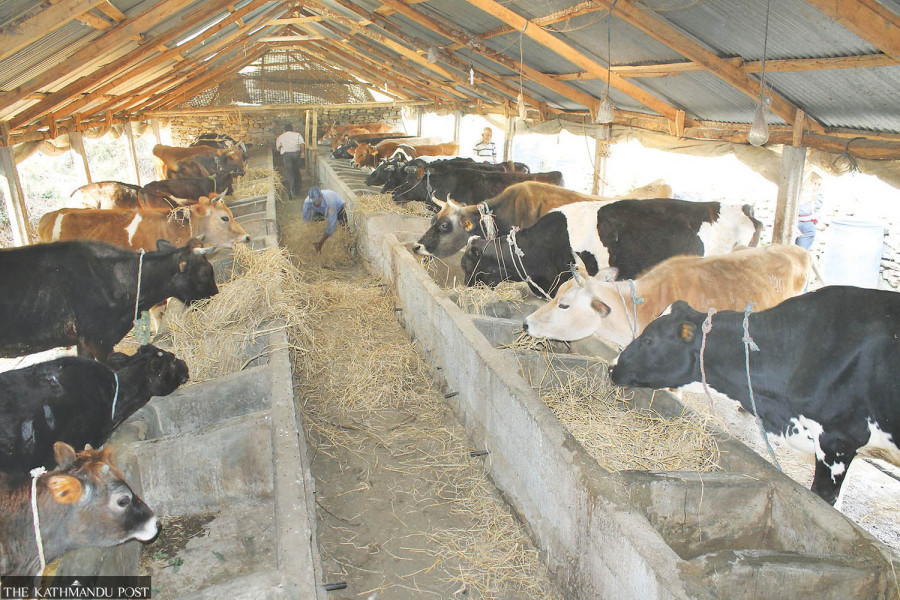National
Farmers yet to be paid over Rs1 billion as milk flush season begins
DDC and private dairies struggle to clear payments amid weak demand and unsold stocks.
Post Report
The milk flush season has begun, but dairy farmers still await payments of over Rs1 billion from the state-owned Dairy Development Corporation (DDC). Much of the dues is from last year.
“When I joined the DDC in mid-September, the dues stood at Rs860 million. We paid Rs300 million in September and are releasing around Rs50 million today [Sunday],” said DDC General Manager Sanjeev Jha.
Nepal has two distinct milk production seasons—flush and lean. The flush season, from August to February, leads to oversupply, while production drops sharply during the lean months. The ratio between lean and flush production is roughly 1:3.
“From now on, our plan is to pay at least Rs300 million monthly, as there is strong pressure from the government. This way, we can clear all dues by February,” said Jha. Until recently, the corporation’s monthly payments averaged only Rs160 million.
In previous years, when private dairies stopped buying milk during the flush season, DDC was compelled to purchase the surplus. The corporation has since been converting excess milk into skimmed milk powder (SMP) and butter.
According to the corporation, it currently has 480 tonnes of SMP and less than 300 tonnes of butter in stock.
Regarding potential exports to China, Jha said the corporation is now focusing on boosting domestic consumption. “Buyers look for uninterrupted supply, but our surplus butter production is inconsistent,” he said.
In December last year, DDC had planned to export butter to Tibet as its dues to farmers piled up.
“Our current priority is to ease farmers’ payments and establish a regular payment and stock management cycle for SMP and butter,” said Jha. “We are developing a business policy to ensure timely payments so that dues do not accumulate during the winter when production is high.”
He added that DDC is also revising milk standards and conducting trial productions as part of its new business plan.
With the onset of winter, domestic milk consumption typically declines, leading to a rise in SMP and butter stockpiles.
Private dairy producers say they have also reached internal agreements with farmers to manage payments.
“We’ve reached an understanding between dairy industries and farmers through internal agreements. The private sector’s dues currently stand at Rs1.5 billion,” said Prahlad Dahal, president of the Nepal Dairy Association.
“As milk production rises in winter and industries are unable to buy all of it, we’ve agreed that payments will be made in March rather than letting the milk go to waste,” he added. The surplus milk is converted into powder during this period.
According to Dahal, farmers are being paid every 25 days.
Currently, the country consumes around 31,000 tonnes of milk and milk products monthly, a figure expected to fall to 25,000 tonnes in winter. The remaining 6,000 tonnes will be turned into milk powder, according to the association.
Butter and powder stocks typically increase during the cold months. The association said its members have about 10,000 tonnes of butter in storage.
Demand started to decline after the government raised the price of raw milk, with the retail cost per litre reaching Rs110. Nepal’s dairy sector has been struggling since then.
In March 2023, the government hiked the minimum purchase price of raw milk paid to farmers by Rs9.1 a litre, setting it at Rs65.5. The problem of delayed payments began to worsen around August 2023.
Falling household incomes, job losses, and a surge in youth migration have reduced demand for dairy products, leaving large volumes unsold and farmers unpaid for months.
Both public and private dairies say the prolonged economic slowdown has dampened consumption and strained cash flow, forcing them to delay payments to farmers. Many dairy products have remained unsold for over a year, they said.




 10.12°C Kathmandu
10.12°C Kathmandu














